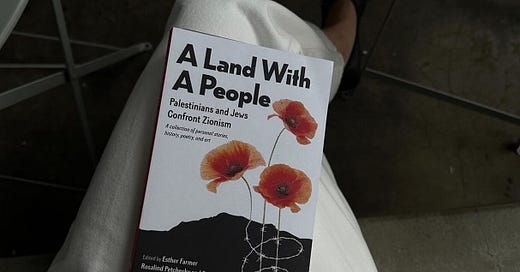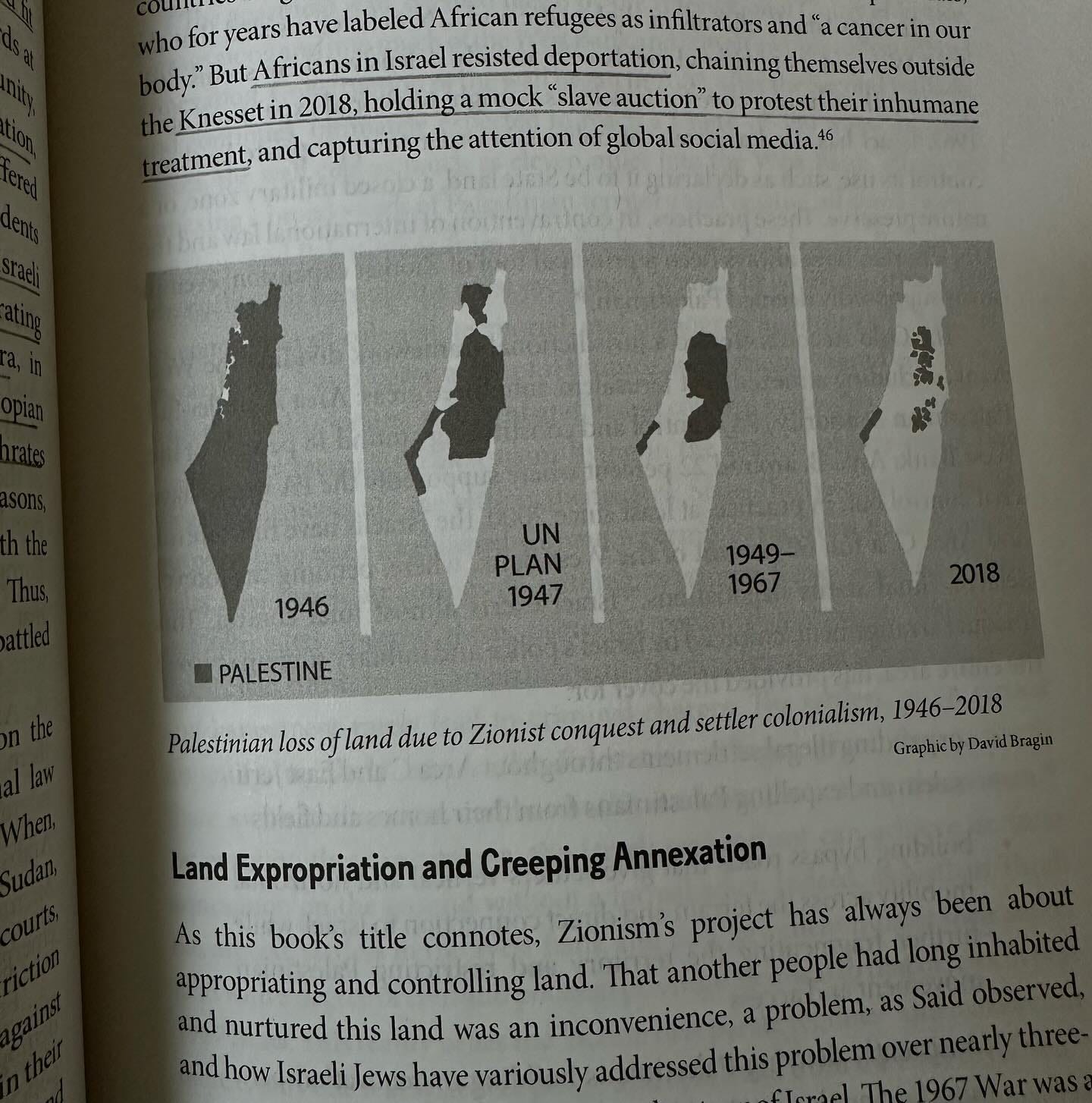recently read: a land with a people
24: plus poetry about girlhood and recent seen library happenings
Knowing what book someone is reading and what parts they resonate with most can be so intimate. It reveals their interests, where their head is at, and what excerpts are so significant that they will mark up a page because they think it’s worth revisiting at a later time. I’m fascinated by what books others gravitate towards and I find that it helps me get to know them better and gives me a small glimpse into who they are at their core. No one asked for these book reviews, but maybe it’s my way of showing who I am and what I’m interested in – beyond the clothes, the products, and my career. Or at the very least, encourage some to look up from their phones and instead towards the pages of a good book.
Book no. 25 of 2023
A Land With a People: Palestinians and Jews Confront Zionism - Esther Farmer
As Israel is destroying libraries in Gaza and violently killing tens of thousands innocent civilians including whole family bloodlines, it’s important now than ever to learn from the resources we can. Librarians and Archivists with Palestine say, “The destruction of cultural heritage in Gaza impoverishes the collective identity of the Palestinian people, irrevocably denies them their history, and violates their sovereignty.”
I highly recommend this book for anyone who wants to get a basic understanding of Israel and Palestine through a digestible, kind and empathetic collection of first hand accounts with history and timelines that are not only informative but also personal and humanizing. The book offers both Palestinian and Jewish perspectives, which provides a necessary reminder that critique of Israel isn’t the same as being anti-semitic. It’s a refreshing resource with human context in a time when we are in taking so much information on social media. It was also written in 2021 — further detailing how this “conflict” did not start on October 7, but that there have been years of oppression and destruction long before then. I have so many pages dogeared and underlined — what is shared below is just a small fraction of the important takeaways from the book.
Underlined quotes:
“Where a man cannot look, he cannot feel and where a man cannot feel, he has not really looked. Without both he will never understand.”
“plant flags, call it home / rename cities and villages / uprooting graveyards / wiping, clearing, cleansing / memory that this / is not theirs”
“Beneath the modern cities of Tel Aviv and Haifa and Jaffa lies a hidden world. Beneath those forests lie the ruined villages of the indigenous inhabitants of Palestine. I read about Deir Yassin and Lydda, the unfamiliar names of Palestinian villages whose very existence had to be disappeared, like the people who once lived there.”
“I was introduced to a Palestinian man whose family fled Jerusalem after the 1967 War… he told me about how his mother was murdered in her own home… they’d fled for their lives, some of them eventually finding safety across the seas. How similar his story is to my own family history.”
“Zionism… is simply appropriating the European settler-colonialist dogma… the claim that the settlers would bring superior intellectual and technological capacity and thus improvement to lands they portrayed as barren and neglected — a spurious claim used to justify indigenous dispossession in Palestine, India, the Americas and elsewhere.”
“Like the US, Israel is a carceral state…a pervasive form of biopolitical conrol over ‘minority’ populations. Since 1967, around 800,000 Palestinians have been arrested and detained: 20% of the entire Palestinian population and 40% of all males.”
“Israel claims to have officially ended its occupation there in 2005… Israeli bombings destroyed 150,258 buildings and displaced or killed tens of thousands of civilians; Israel also controls all avenues in and out of Gaza, restricts the import of food, medical and building supplies, and restricts electricity access… over 90% of Gaza’s water is undrinkable and, according to UN officials, its conditions of life have become unlivable.”
Book no. 26 of 2023
If My Body Could Speak - Blythe Baird
A collection of poems about the things girls do to be liked and accepted even at the expense of themselves. Poems about coming of age struggles and body image as well as sexual assault and eating disorders. It’s about forgiving ourselves for the choices we thought we had to make. I recommend.
Underlined quotes:
“if you develop an eating disorder / when you are already thin to begin with / you go to the hospital / if you develop an eating disorder / when you are not thing to begin with / you are a success story”
“Before they promise to make you beautiful / you had almost forgotten that you weren’t”
“I am ashamed of keeping my feminism in my pocket until it is convenient not to like at poetry slams or in women’s studies classes / there are days I want people to like me / more than I want to change the world”
“It is the dilemma of the woman who wishes to inform the misogynist politely”
“If your body could speak, would she forgive you?”
“Writing is the ongoing act of forgiving and apologizing / to the woman I used to be”
Recent Seen Library happenings
The first Seen Library profile in nearly a year with my dear friend AJ Girard. I share how we met, why we decided to co-host not one, but two book exchanges together, the book that laid the foundation to his art career and his favorite bookstores in LA.
An incredible moving book giving with KOTN that left us in tears and with many laughs. The books were focused on stories that’ll be passed down for generations, ones that honor those who come before us and continue in those after us. Stories that provide a rich depiction of our interconnected experiences and that offer us a deeper understanding of culture, identity and community. With that, we shared the things that have been passed down to us and what we hope to pass down to others. Some spoke of the things they want to keep — respect and continuation of their cultures, family recipes, joyful celebration, resilience and finding the comfort in discomfort. Some spoke of the things they didn’t get but want to pass on, starting with them — validating emotions, saying I love you, asking for help, encouragement to find ones identity outside of familial expectations. More here.
A fundraiser in support of Healing our Homeland with Hike Clerb. The first 20 attendees who donated to the Palestinian woman-led organization providing aid and resources on the ground in Gaza received a free wrapped book, all written by Palestinian authors. Healing our Homeland is a grassroots movement that use collective action to empower women and children through compassion, awareness, and individualized support. If you’d like to make a direct donation, please click the hyperlink above. Some books that were shared: Palestinian Walks, Salt Houses, In My Mother’s Footsteps, Minor Detail, Against the Loveless World




